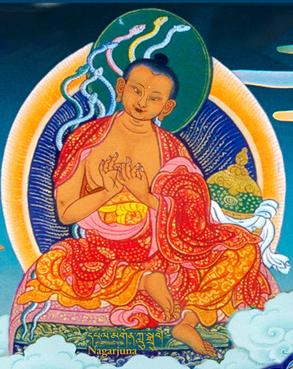
XXIV.1.
Then you must incorrectly conclude that there is non-existence of the four holy truths.
XXIV.2.
The “becoming” enlightened (bhavana), and the “realization” of the goal are impossible.
XXIV.3.
In the non-existence of fruit there is no “residing in fruit” nor obtaining.
XXIV.4.
Because there is non-existence of the four holy truths, the real dharma does not exist.
XXIV.5.
By speaking thus, that everything is empty certainly you deny the three jewels, the Buddha, the dharma, and the community.
XXIV.6.
And all the practical behavior of the world as being empty.
XXIV.7.
You eliminate both “emptiness” itself and its purpose from it.
XXIV.8.
The world-ensconced truth and the truth which is the highest sense.
XXIV.9.
Do not know the profound “point” (tattva) in the teaching of the Buddha.
XXIV.10.
And without having understood the highest sense one cannot understand nirvana.
XXIV.11.
It is like a snake wrongly grasped or magical knowledge incorrectly applied.
XXIV.12.
Having thought about the incomprehensibility of the dharma by the stupid.
XXIV.13.
But that refutation does not apply to our emptiness.
XXIV.14.
If emptiness “does not work”, then all existence “does not work”.
XXIV.15.
Are like a person who, having mounted his horse, forgot the horse!
XXIV.16.
You perceive that there are uncaused and unconditioned things.
XXIV.17.
And the origination, destruction, and “fruit.”
XXIV.18.
This apprehension, i.e., taking into account all other things, is the understanding of the middle way.
XXIV.19.
No dharma whatever exists which is not empty.
XXIV.20.
You must wrongly conclude then that the four holy truths do not exist.
XXIV.21.
It is said that sorrow (dukkha) is not eternal; therefore, certainly it does not exist by its own nature (svabbava).
XXIV.22.
For him who denies emptiness there is no production.
XXIV.23.
By trying to establish “self-existence” you deny destruction.
XXIV.24.
If that path is brought into existence, then “self-existence,” which you claim does not exist.
XXIV.25.
What kind of path will obtain the destruction of sorrow (dukkha)?
XXIV.26.
Indeed, is it not true that self-existence is that which endures?
XXIV.27.
Nor are the four holy fruits possible for you.
XXIV.28.
How can it be known at all?
XXIV.29.
When the community of Buddhists does not exist, then those eight “kinds of persons” do not exist.
XXIV.30.
And if there is no dharma and community, how will the Buddha exist?
XXIV.31.
Or enlightenment comes into being independent of the one who is enlightened.
XXIV.32.
Will not attain the enlightenment though the “way of life of becoming fully enlightened.”
XXIV.33.
What is produced which is non-empty? Certainly self-existence is not produced.
XXIV.34.
Since, for you, the product caused by dharma or non-dharma does not exist.
XXIV.35.
How can that product, being originated by dharma or non-dharma empty?
XXIV.36.
When you deny emptiness in the sense of dependent co-origination (patytya-samutpada).
XXIV.37.
There would be nothing whatever acted upon, and a producing action would be something not begun.
XXIV.38.
Then it will exist as un-produced, undestroyed and immutable.
XXIV.39.
There is cessation of sorrow (dukkha) and actions, and all evil is destroyed.
XXIV.40.
Also understands sorrow (dukkha), origination, and destruction as well as the path of release.
Source: Orientalia




